Jerry Springer saves mankind, and other operas
June 14, 2006
________________________________________________________
The true saviour?Hundreds of irate Christian protesters are massing this week in Wales to protest a performance of "Jerry Springer -- The Opera", calling it blasphemous, offensive and altogether rude. One het-up website in Britain describes the show (a huge hit over there) thusly:
"I don’t want to go into too much detail, but the Lord Jesus is portrayed in ‘Springer’ as an infantile sexual deviant. Satan tells Him ‘F--- you’, and Mary his blessed mother castigates Him for abandoning her when He died on the cross. His wounds are mocked, He says He is ‘a little bit gay’ and finally Jerry Springer tells him: ‘Jesus, grow up for Chr---’s sake and put some f---ing clothes on.’ On top of all that, Almighty God is portrayed as an ineffectual inadequate who needs Jerry Springer’s shoulder to cry on, and Springer himself emerges as the true saviour of mankind."
Sure sure sure -- but what about the music?
Adrian Butler in the Liverpool Echo has a drily funny take on braving the protestors to see what all the fuss is about. "There's basically one joke, and it goes like this: four letter words and phrases like "chick with a d**k", when sung in an opera, become hilariously funny," he writes, adding: "Musically, it's more complex than I expected. Richard Thomas's wide-ranging classical music take-offs are startlingly clever -- by turns eerie, touching and singable."
In The Guardian this week, David Ward has a short, thin but still interesting account of participating in a chorus of 700 -- seven hundred! -- singing Thomas Tallis' "Spem in Alia" -- a work so beautiful the human head can barely contain it. "We sang the final mighty chord," he writes, "and stood amazed through the long, enveloping silence that followed." Jealous? Me too.
Also worth reading is Andrew Clark's nicely-done overview of the just-concluded Ojai Festival in the Financial Times. "It’s the rubbing-together of the primitive and the sophisticated that lends Ojai its charm," he writes. "But a festival cannot live on its past, and Ojai today faces the same questions as any other niche event: how to preserve its character and satisfy demand in a changing cultural climate."

Pauline Malefane as CarmenAnd in case you missed it, there's a new film version of Bizet's "Carmen" making the rounds. The twist: it's set in a modern-day slum outside Capetown, and is sung in Xhosa - the South African language known for its clicking sounds.
"U-Carmen eKhayelitsha" is "moderately watchable", says Arthur Kaptainas in The Gazette. "There could be no bullfight, alas," he cautions, in an otherwise positive review. More info here on this film, which took the Golden Bear award at the Berlin International Film Festival last year.
Chicago Sun-Times critic Wynne Delacoma writes this week about a new cantata performed at the Ravinia Festival by Opera Africa, the same group that brought the Zulu-language opera "Princess Magogo,'' by composer Mzilikazi Khumalo and librettist Themba Msimang, to town in 2003. The new piece (by the same composer), is called "uShaka,'' and tells the story of a legendary Zulu king.
"Khumalo composes in a thoroughly Western style, but the Zulu musical scale and its emphasis on music for massed voices makes for a smooth blend of traditions," Delacoma writes. "At times "uShaka,'' especially its choral numbers, brought to mind the melancholy solemnity of 19th century Russian opera as well as strong hints of heroic Verdi."
"It takes courage to improvise, to leap off the cliff," says Paul Cram, whose Sonic Courage Festival opens in Halifax, Nova Scotia tonight; on the menu are bassist Barry Guy and baroque violinist Maya Homburger, who do contemporary improvisations based on early music. The program features an interpretation of the 12th Century hymn "Veni Creator Spiritus" -- the same work that inspired Gustav Mahler to make the courageous leap of the Eighth Symphony.
Gyorgi Ligeti, 1923-2006
June 12, 2006
________________________________________________________ The irreplaceable Gyorgi Ligeti -- who stretched our ears for decades with his limitless musical imagination -- passed away today at 83. The sound of the world -- of the whole universe -- just got a lot less interesting.
The irreplaceable Gyorgi Ligeti -- who stretched our ears for decades with his limitless musical imagination -- passed away today at 83. The sound of the world -- of the whole universe -- just got a lot less interesting.
Goodbye; thank you for all of it.
Mahler's Eighth, and Ammirati at the Blazin' Bee
June 8, 2006
______________________________________________________________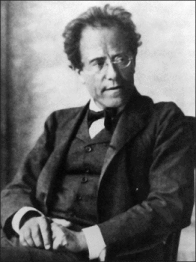 Mahlermania hits DC this weekend, as the National Symphony Orchestra ends its 75th season with three sold-out performances of Mahler's Symphony No. 8, aka the "Symphony of a Thousand."
Mahlermania hits DC this weekend, as the National Symphony Orchestra ends its 75th season with three sold-out performances of Mahler's Symphony No. 8, aka the "Symphony of a Thousand."
Mahler thought it was the greatest thing he had ever done: “It is something the world has never heard the likes of before,” he wrote, shortly after finishing the work in 1906. “Imagine the universe beginning to ring and resound. There are no longer human voices, but planets and suns revolving in their orbits."
I have a longish walk-up to it in the Washington Post today -- any insight in it is due to the extraordinary scholar Henry-Louis de La Grange, who patiently and eloquently opened up the work for me from his home in Switzerland.
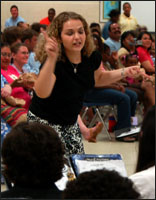
Christina AmmiratiLast night, of course, was the musical event of the season: the Spring Concert of Hollin Meadows Elementary School, held in the Blazin' Bee Cafe (Mottos: Have a Nice Lunch! Stay in Your Seat!). Band director Christina Ammirati was amazing as always -- anyone who can take sixty-three kids, fashion them into a razor-sharp band, and leave them all excited and inspired at the end is a pure golden gift to the musical community.
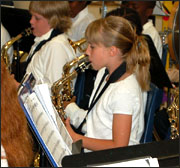 Imaginative programming and tight, exciting playing dominated the evening, as they have throughout Ammirati's three-year reign. The players put on water wings for Les Taylor's "Shark Attack," paper bags were passed around for the cannons in Tchaikovsky's "Overture 1812", and the shouted conclusion to "Let's Go Band!" rivaled Beethoven's Ninth for sheer adrenalin-pumping excitement. Dynamite playing from all the kids, who are too numerous to mention by name -- except for Leila, of course, because, hey -- it's my blog.
Imaginative programming and tight, exciting playing dominated the evening, as they have throughout Ammirati's three-year reign. The players put on water wings for Les Taylor's "Shark Attack," paper bags were passed around for the cannons in Tchaikovsky's "Overture 1812", and the shouted conclusion to "Let's Go Band!" rivaled Beethoven's Ninth for sheer adrenalin-pumping excitement. Dynamite playing from all the kids, who are too numerous to mention by name -- except for Leila, of course, because, hey -- it's my blog.
Nurit Bar-Josef & Co. at the KenCen
June 6, 2006
____________________________________________________________ I would walk barefoot on hot coals over a Himalayan peak while being pelted with wet asteroids to hear the NSO's concertmaster, Nurit Bar-Josef, play chamber music.
I would walk barefoot on hot coals over a Himalayan peak while being pelted with wet asteroids to hear the NSO's concertmaster, Nurit Bar-Josef, play chamber music.
I mean it! I would!
Sunday's concert at the Terrace Theater took a while to catch fire, but by the end there was no place on the planet you'd rather be. Here's my two cents:
The Washington Post: It’s probably not fair to hold year-long celebrations of any composer, no matter how great. Poor Mozart – he’s been on so many programs this year that concertgoers are starting to cringe at the sight of his name, muttering: “Oh -- you again.”
But in their last concert of the season on Sunday, the Kennedy Center Chamber Players put any Mozart-fatigue to rest with the Piano Quartet No. 1 in G minor, K. 478. It’s an astoundingly beautiful and complex work, and pianist Lambert Orkis, with Marissa Regni on violin, Daniel Foster on viola and David Hardy manning the cello, gave it an engaging, well-crafted reading. The work’s stormy emotions felt a bit pallid, as if unwilling to give offense, but it was a treat to hear nonetheless.
Clarinetist Loren Kitt gave a similarly thoughtful reading to Paul Hindemith’s Clarinet Sonata in B-flat major. It’s a warm but dry work, full of wistfulness and restrained ardor, and Kitt played it with immaculate taste; an agreeable Sunday afternoon performance.
The quiet, however, was about to explode. Richard Strauss’ youthful Piano Quartet in C minor, Op. 13 was next on the program, and Nurit Bar-Josef – the National Symphony Orchestra’s formidable concertmaster – took the stage, decked out gypsy-like in fringes and sashes and glittering whatnots as far as the eye could see. And from the moment she put bow to strings the entire Terrace Theater came alive. Bar-Josef plays with white-hot ferocity, and she unleashed this exuberant work – written when Strauss was not yet twenty – like a thunderbolt. And what more could you wish for on a pleasant Sunday afternoon in June?
In which Sting gets a lute
June 6, 2006
__________________________________________________________________ And just in time for the DC Early Music Festival ... Sting has announced that he's going to be releasing an album of 16th Century lute music in October -- and on Deutsche Grammophon, no less. Who knew he was a Dowland fan? (As is Elvis Costello, apparently -- trendspotters take note!) Read more on the official Sting website, where he helpfully alerts fans that the lute is "a 16th Century instrument with lots and lots of strings." Rock on!
And just in time for the DC Early Music Festival ... Sting has announced that he's going to be releasing an album of 16th Century lute music in October -- and on Deutsche Grammophon, no less. Who knew he was a Dowland fan? (As is Elvis Costello, apparently -- trendspotters take note!) Read more on the official Sting website, where he helpfully alerts fans that the lute is "a 16th Century instrument with lots and lots of strings." Rock on!
Crunchy vegetables, Mahler 8th and other tastes
June 5, 2006
_____________________________________________________
Grrr -- missed the opening of Mozart's Idomeneo this weekend (insert gnashing of teeth, pulling of hair) but was more than consoled by the Folger Consort/Concord Ensemble performance in the Folger Library's Elizabethan Theater on Friday, and the amazing Nurit Bar-Josef leading the KenCen Chamber players through Richard Strauss' early piano Quartet in C Minor on Sunday -- which just about took the top of my head off (review published tomorrow). (Tom Huizenga covered Idomeneo for the Post, and Charles T. Downey over it ionarts has a more extended take on it.)
A fascinating conversation this weekend with Henry Louis de la Grange, Mahler scholar extraordinaire, to discuss the Eighth Symphony's continuing appeal. “He was in a state of real ecstasy when he wrote that symphony,” he said in a telephone interview from his home in Switzerland. “And it’s a great spiritual statement -- a message of hope for humanity as a whole. Some people find it hard to understand, because they feel that Mahler has to be morbid, or he isn’t Mahler -- but that is just simply wrong!” It opens at the Kennedy Center on Thursday night, for three nights -- all sold out weeks ago.
Here's a quick take on Friday's Folger Consort performance: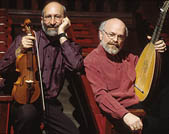
The Folger Consort
The Washington Post: Renaissance music -- with its crunchy textures and low-fat sonorities -- can sometimes seem like the plate of raw vegetables at the classical music buffet. But in the right hands this music can reveal rich and meaty depths, as the multi-talented Folger Consort demonstrated this weekend at the Folger Shakespeare Library.
The Folger teamed up with the vocalists of The Concord Ensemble on Friday night for an intriguing launch to this year’s Washington Early Music Festival. Alternating instrumental pieces from composers like Girolamo Frescobaldi and Salamone Rossi with 16th Century vocal works by Luca Marenzio (a.k.a. “the Schubert of the madrigal”) and Thomas Morley, the players delivered precise, elegant performances – but also pushed through the music’s courtly façade to reveal the fires at its core.
And that’s easier said than done. The hurdles to a satisfying historically-accurate performance can be huge -- lutenist Christopher Kendall got a round of applause just for tuning the approximately six thousand strings of his theorbo -- but so are the rewards. Robert Mealy, cradling his violin at chest level, turned in some profoundly moving playing (Tobias Hume's "The passion of musicke" was a minor miracle), as did Brent Wissik on viol.
But the focus was really on the singing, and the Concord Ensemble delivered spectacularly, with exceptional control and feeling. And, while there was a certain amount of happy tra-la-la-ing in the bosky dell -- you can’t get through a madrigal evening without it – the music was more often hauntingly beautiful: delicate tapestries barely concealing a sea of dark and hungry passions.
"L'Italiana" ends ... but early music begins
June 1, 2006
_____________________________________________________________
The Washington Early Music Festival 2006 kicks off its third season tomorrow night, focusing this year on Italian music from the medieval, renaissance and baroque eras. We'll be at the Folger Shakespeare Library for the Folger Consort and the Concord Ensemble, performing music by the Italian Luca Marenzio (a.k.a. "the Schubert of the madrigal") and the English (but influenced by Italy!) Thomas Morley. Should be great fun; if you can't make that concert, it repeats on Saturday and Sunday -- check the schedule for times. 
Also this weekend, two performances by Opera Lafayette of Mozart's gorgeous "Idomeneo" at Clarice Smith Performing Arts Center, with pre-concert discussions. More info here.
Saturday's also the last night for the WNO's boisterous (to say the least) production of L'Italiana in Algeri. We got to see Tuesday night's show, introducing a new tenor in the role of Lindoro. Here's the review:
The Washington Post: The Washington National Opera’s wonderfully antic performance of “L’Italiana in Algeri” – Rossini’s tale of a quick-witted Italian girl who outsmarts a boorish sultan and escapes with her true love – is in its last days, and anyone in the market for opera buffa on steroids should hie themselves to the Kennedy Center without delay.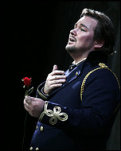
Robert McPhersonTuesday night’s performance introduced a new tenor -- Robert McPherson -- as Lindoro, and he brought a clear, confident voice and a deft comic touch to the role. McPherson had a tough act to follow – he’s replacing the brilliant Peruvian singer (and global heart-throb) Juan Diego Florez, who’s had critics and audiences in a swoon since his rise to bel canto stardom began several years ago.
And at first sight, McPherson resembles a stack of laundry more than the dashing young gallant he’s supposed to play. But he navigated Rossini’s daunting pyrotechnics with style and finesse, and if his stage presence seemed a bit mild, that may have been due to the powerful competition onstage -- from mezzo Olga Borodina’s full-bodied portrayal of the clever Isabella, to bass Ildar Abdrazakov as the pelvis-thrusting sultan, to Lyubov Petrova playing the faithful Elvira – who pulled out all the stops. All in all, a hugely enjoyable production, heading, alas, into its final night on Saturday. Move fast. (Photo by Karin Cooper)

